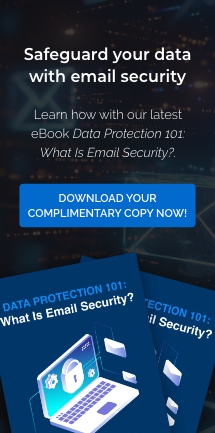Did you know the average website is attacked 94 times every day? As cybercriminals become better equipped with more advanced technology, that number will increase. Small-business websites (and small businesses, in general) are the most at risk for attack. Small businesses are tempting targets because SMB websites are often a direct link to that SMB’s network, where all kinds of goodies are stored, including sensitive business and customer data.
This is data cybercriminals want.
Cybercriminals and hackers can be aggressive when it comes to attempting to access your network and data. They use malware, ransomware, phishing scams, bot attacks and even direct attacks to get to your data. If you don’t have protections in place against these kinds of incursions, you are putting your business in harm’s way.
There are many “barriers” you can put between your business and the bad guys, but there are four things you can do (and should do) right now to put yourself ahead of the curve. These will protect your business and protect your data.
1. Create A Culture Of Awareness.
Education is a powerful tool, and that is 100% true when it comes to cyber security. There are several steps you can take to create a culture of awareness. This includes employee cyber security training, along with ongoing education that keeps everyone in your organization informed about the latest threats and the latest ways to combat those threats.
Training helps your team identify threats and recognize when someone is trying to break into your network (such as through a phishing scam). Because cyber threats are constantly evolving, ongoing education will keep these threats top of mind, so as the threats change, your team is right there on the frontlines ready to take on whatever may be around the corner.
2. Monitor Threats 24/7.
This is where partnering with an experienced IT services firm really comes in handy. Coming back to point #1, an IT services company can help you create that culture of awareness, but more than that, they can keep two eyes on your network 24/7. This way, if something or someone attempts to force their way into your network, they can stop it before it becomes a problem.
Even better, threat monitoring helps protect your team from more common types of attacks, such as malware or ransomware attacks. Should an employee accidentally click a harmful link or download a malicious program, it can be isolated before it takes hold and spreads.
3. Make Sure Protections Are Up-To-Date.
Practically every piece of hardware and software you use needs to be updated at some point. When you don’t update, you put yourself at serious risk. Hackers are constantly looking for vulnerabilities in the apps and devices you use. CRM software is a good example. This software connects your business with customers, and it can be used to store all kinds of information, from very basic contact information to very sensitive customer-specific data.
Should a vulnerability be found, hackers won’t waste any time attempting to exploit it. In response, the makers of that CRM software should send out a security patch. If you do not make the update (or have the update automatically installed), your risk increases significantly.
Again, working with an IT services firm or a managed services provider can help you address this minor – but very important – step. They can ensure everything under your roof is up-to-date and that you have all the latest
protections.
4. Have A Plan.
Every single person on your team should be on the same page. They should all change their passwords every 60–90 days. They should all be required to use secure passwords. They should know how to identify potential phishing scams. They should know who to call if the network or their devices go down for any reason. You should know exactly what to do if your on-site data becomes compromised in any way, whether it’s due to malware, a natural disaster (flooding, fire, etc.) or hardware failure.
In short, you should have an IT handbook – a plan that spells out every detail of your IT protocol and cyber security strategies. This goes hand in hand with the three points we’ve already discussed: awareness, threat monitoring and keeping hardware and software updated. When you have a plan, you know exactly what to do when threats come your way. You’re ready and aware.
Cyber threats are always going to be out there. There isn’t anything you can do about that. But there are things you can do for yourself and your business to prepare for those threats. Put these four points into action, work with an IT services provider and give yourself the advantage over those who want to take advantage.

